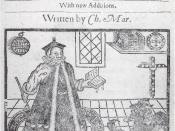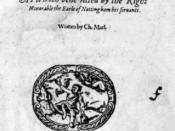From the opening soliloquy, the reader is given a great insight into how Faustus' mind works, how he uses logic and his intellect to draw up conclusions, and it is possible for one to forecast future events and occurrences involving Faustus on the basis of this initial passage. The opening two lines of his soliloquy indicate that he is often quick at making decisions;
"Settle thy studies, Faustus and begin
To sound the depth of that thou wilt profess:"
In lines 3-7, Faustus is demonstrating that he has succeeded in understanding all that one needs to know in the field of knowledge and philosophy. In this section he demonstrates his great knowledge to the audience by referring to respected philosophers and showing how he fully understands and appreciates them, for example stating that he will "live and die in Aristotle's works".
Faustus' references to himself are almost always in the third person throughout this passage.
This unusual manner of speech has several functions. Firstly, someone who refers to himself or herself by name is generally thought of as egotistical and arrogant; therefore, his usage of the third person reinforces the reader's opinion of Faustus as a pretentious man who. However in Faustus' final soliloquy, Faustus begins to refer to himself more as 'I' and 'Me' perhaps showing his realisation that he in not immortal or perfect, and giving him a more humble appearance, thereby gaining our sympathies;
"This soul fly away from me and I be changed...
Cursed be the parents that endangered me..."
Secondly, by referring to himself by name, Faustus creates an image of a mythological figure, separate from Faustus the man. The separation between the two entities resonates with a major theme of the play, which questions the division between the human and the...


